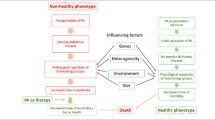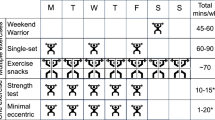Abstract
Background
Meta-analyses of randomized controlled trials (RCTs) have shown the beneficial effect of exercise on HDL-cholesterol (HDL-C) levels. However, systematic reviews are not free of bias, and this could call into question their results.
Objectives
The aim of this work was to conduct a critical assessment of meta-analyses of RCTs that analyze the association between exercise and HDL-C levels, evaluating their results and the risk of bias (RoB).
Methods
This systematic review of MEDLINE and EMBASE included meta-analyses of RCTs that studied the effects of exercise on HDL-C levels in healthy adults or patients at cardiovascular risk. The RoB was determined using AMSTAR-2, and information was obtained on exercise and the variation in HDL-C levels.
Results
Twenty-three meta-analyses were included. Great variability was found in exercise (different types, frequencies or intensities in the studied interventions). All the analyses found an improvement in HDL-C levels, ranging from 0.27 to 5.41 mg/dl, in comparison with the control group (no exercise). The RoB was very high, with 18 reviews obtaining a critically low confidence level and the remaining works obtaining the highest confidence level.
Conclusions
Only one meta-analysis showed good quality, in which HDL-C levels increased by 3.09 mg/dl in healthy adults and patients at high cardiovascular risk who practiced yoga. The rest had high RoB. Therefore, new systematic reviews with low RoB are needed to apply the results to clinical practice.
Register: CRD42020158471 (PROSPERO).


Similar content being viewed by others
Data availability statement
There are no underlying data in this work.
References
World Health Organization. Cardiovascular diseases (CVDs). https://www.who.int/news-room/fact-sheets/detail/cardiovascular-diseases-(cvds). Updated 17 May 2017. Accessed 3 Feb 2020.
Allender S, Scarborough P, Peto V, et al. European cardiovascular disease statistics. Bruselas: European Heart Network; 2008.
Mosca L, Barrett-Connor E, Wenger NK. Sex/gender differences in cardiovascular disease prevention: what a difference a decade makes. Circulation. 2011;124:2145–54.
Goldstein JL, Brown MS. A century of cholesterol and coronaries: from plaques to genes to statins. Cell. 2015;161:161–72.
Hernáez Á, Castañer O, Elosua R, et al. Mediterranean diet improves high-density lipoprotein function in high-cardiovascular-risk individuals: a randomized controlled trial. Circulation. 2017;135:633–43.
Hadi A, Pourmasoumi M, Mohammadi H, et al. The impact of pycnogenol supplementation on plasma lipids in humans: a systematic review and meta-analysis of clinical trials. Phytother Res. 2019;33:276–87.
Simental-Mendía LE, Pirro M, Gotto AM Jr, et al. Lipid-modifying activity of curcuminoids: a systematic review and meta-analysis of randomized controlled trials. Crit Rev Food Sci Nutr. 2019;59:1178–87.
Yu L, Zhou C, Luo Z, et al. The lipid-lowering effects of Danhong and Huangqi injections: a meta-analysis of clinical controlled trials. Lipids Health Dis. 2018;17:106.
Zou L, Zhang Y, Sasaki JE, et al. Wuqinxi Qigong as an alternative exercise for improving risk factors associated with metabolic syndrome: a meta-analysis of randomized controlled trials. Int J Environ Res Public Health. 2019;16:1396.
Igarashi Y, Nogami Y. Response of lipids and lipoproteins to regular aquatic endurance exercise: a meta-analysis of randomized controlled trials. J Atheroscler Thromb. 2019;26:14–30.
Wewege MA, Thom JM, Rye KA, et al. Aerobic, resistance or combined training: A systematic review and meta-analysis of exercise to reduce cardiovascular risk in adults with metabolic syndrome. Atherosclerosis. 2018;274:162–71.
Ostman C, Smart NA, Morcos D, et al. The effect of exercise training on clinical outcomes in patients with the metabolic syndrome: a systematic review and meta-analysis. Cardiovasc Diabetol. 2017;16:110.
Cui J, Yan JH, Yan LM, et al. Effects of yoga in adults with type 2 diabetes mellitus: a meta-analysis. J Diabetes Investig. 2017;8:201–9.
OCEBM Levels of Evidence Working Group. The Oxford 2011 levels of evidence. Oxford centre for evidence-based medicine. https://www.cebm.net/index.aspx?o=5653. Updated 1 May 2018. Accessed 24 Feb 2020.
Shea BJ, Reeves BC, Wells G, et al. AMSTAR 2: a critical appraisal tool for systematic reviews that include randomised or non-randomised studies of healthcare interventions, or both. BMJ. 2017;358:j4008.
Jin X, Wang J, Li X, et al. Quality assessment of systematic review of the bariatric surgery for diabetes mellitus. J Diabetes Res. 2019;2019:9541638.
Perry R, Leach V, Davies P, et al. An overview of systematic reviews of complementary and alternative therapies for fibromyalgia using both AMSTAR and ROBIS as quality assessment tools. Syst Rev. 2017;6:97.
Moher D, Liberati A, Tetzlaff J, PRISMA Group, et al. Preferred reporting items for systematic reviews and meta-analyses: the PRISMA statement. PLoS Med. 2009;6:e1000097.
Higgins JPT, Green S. Cochrane handbook for systematic reviews of interventions version 5.1.0. The Cochrane Collaboration; 2011.
Alenazi AM, Alshehri MM, Hoover JC, et al. The effect of T’ai Chi exercise on lipid profiles: a systematic review and meta-analysis of randomized clinical trials. J Altern Complement Med. 2018;24:220–30.
Lemes ÍR, Turi-Lynch BC, Cavero-Redondo I, et al. Aerobic training reduces blood pressure and waist circumference and increases HDL-c in metabolic syndrome: a systematic review and meta-analysis of randomized controlled trials. J Am Soc Hypertens. 2018;12:580–8.
Wen J, Lin T, Cai Y, et al. Baduanjin exercise for type 2 diabetes mellitus: a systematic review and meta-analysis of randomized controlled trials. Evid Based Complement Altern Med. 2017;2017:8378219.
Cai M, Zou Z. Effect of aerobic exercise on blood lipid and glucose in obese or overweight adults: a meta-analysis of randomised controlled trials. Obes Res Clin Pract. 2016;10:589–602.
Huang XL, Pan JH, Chen D, et al. Efficacy of lifestyle interventions in patients with type 2 diabetes: a systematic review and meta-analysis. Eur J Intern Med. 2016;27:37–47.
Chu P, Gotink RA, Yeh GY, et al. The effectiveness of yoga in modifying risk factors for cardiovascular disease and metabolic syndrome: a systematic review and meta-analysis of randomized controlled trials. Eur J Prev Cardiol. 2016;23:291–307.
Cramer H, Lauche R, Haller H, et al. Effects of yoga on cardiovascular disease risk factors: a systematic review and meta-analysis. Int J Cardiol. 2014;173:170–83.
Pattyn N, Cornelissen VA, Eshghi SR, et al. The effect of exercise on the cardiovascular risk factors constituting the metabolic syndrome: a meta-analysis of controlled trials. Sports Med. 2013;43:121–33.
Malakou E, Linardakis M, Armstrong MEG, et al. The combined effect of promoting the Mediterranean diet and physical activity on metabolic risk factors in adults: a systematic review and meta-analysis of randomised controlled trials. Nutrients. 2018a;10:1577.
Zhang X, Devlin HM, Smith B, et al. Effect of lifestyle interventions on cardiovascular risk factors among adults without impaired glucose tolerance or diabetes: a systematic review and meta-analysis. PLoS ONE. 2017;12:e0176436.
Igarashi Y, Akazawa N, Maeda S. Effects of aerobic exercise alone on lipids in healthy east Asians: a systematic review and meta-analysis. J Atheroscler Thromb. 2019;26:488–503.
Costa RR, Buttelli ACK, Vieira AF, et al. Effect of strength training on lipid and inflammatory outcomes: systematic review with meta-analysis and meta-regression. J Phys Act Health. 2019;16:477–91.
Zhang Y, Xu L, Zhang X, et al. Effects of different durations of aerobic exercise on the cardiovascular health in untrained women: a meta-analysis and meta-regression. J Sports Med Phys Fit. 2018;58:1525–36.
Zou Z, Cai W, Cai M, et al. Influence of the intervention of exercise on obese type II diabetes mellitus: a meta-analysis. Prim Care Diabetes. 2016;10:186–201.
Hespanhol Junior LC, Pillay JD, van Mechelen W, et al. Meta-analyses of the effects of habitual running on indices of health in physically inactive adults. Sports Med. 2015;45:1455–68.
Lin X, Zhang X, Guo J, et al. Effects of exercise training on cardiorespiratory fitness and biomarkers of cardiometabolic health: a systematic review and meta-analysis of randomized controlled trials. J Am Heart Assoc. 2015;4:e002014.
Hartley L, Dyakova M, Holmes J, et al. Yoga for the primary prevention of cardiovascular disease. Cochrane Database Syst Rev. 2014;5:010072.
Hayashino Y, Jackson JL, Fukumori N, et al. Effects of supervised exercise on lipid profiles and blood pressure control in people with type 2 diabetes mellitus: a meta-analysis of randomized controlled trials. Diabetes Res Clin Pract. 2012;98:349–60.
Kodama S, Tanaka S, Saito K, et al. Effect of aerobic exercise training on serum levels of high-density lipoprotein cholesterol: a meta-analysis. Arch Intern Med. 2007;167:999–1008.
Kelley GA, Kelley KS. Aerobic exercise and lipids and lipoproteins in men: a meta-analysis of randomized controlled trials. J Mens Health Gend. 2006;3:61–70.
Cornelissen VA, Fagard RH. Effects of endurance training on blood pressure, blood pressure-regulating mechanisms, and cardiovascular risk factors. Hypertension. 2005;46:667–75.
Kelley GA, Kelley KS, Tran ZV. Exercise, lipids, and lipoproteins in older adults: a meta-analysis. Prev Cardiol. 2005;8:206–14.
Kelley GA, Kelley KS, Tran ZV. Aerobic exercise and lipids and lipoproteins in women: a meta-analysis of randomized controlled trials. J Womens Health (Larchmt). 2004;13:1148–64.
Halbert JA, Silagy CA, Finucane P, et al. Exercise training and blood lipids in hyperlipidemic and normolipidemic adults: a meta-analysis of randomized, controlled trials. Eur J Clin Nutr. 1999;53:514–22.
Murtagh EM, Nichols L, Mohammed MA, et al. The effect of walking on risk factors for cardiovascular disease: an updated systematic review and meta-analysis of randomised control trials. Prev Med. 2015;72:34–43.
Cramer H, Langhorst J, Dobos G, et al. Yoga for metabolic syndrome: a systematic review and meta-analysis. Eur J Prev Cardiol. 2016;23:1982–93.
Yan JH, Gu WJ, Pan L. Lack of evidence on Tai Chi-related effects in patients with type 2 diabetes mellitus: a meta-analysis. Exp Clin Endocrinol Diabetes. 2013;121:266–71.
Kelley GA, Kelley KS. Impact of progressive resistance training on lipids and lipoproteins in adults: a meta-analysis of randomized controlled trials. Prev Med. 2009;48:9–19.
Kelley GA, Kelley KS, Vu TZ. Aerobic exercise, lipids and lipoproteins in overweight and obese adults: a meta-analysis of randomized controlled trials. Int J Obes (Lond). 2005;29:881–93.
George ES, Marshall S, Mayr HL, et al. The effect of high-polyphenol extra virgin olive oil on cardiovascular risk factors: a systematic review and meta-analysis. Crit Rev Food Sci Nutr. 2019;59:2772–95.
Alhassan A, Young J, Lean MEJ, et al. Consumption of fish and vascular risk factors: a systematic review and meta-analysis of intervention studies. Atherosclerosis. 2017;266:87–94.
Malakou E, Linardakis M, Armstrong MEG, et al. The combined effect of promoting the mediterranean diet and physical activity on metabolic risk factors in adults: a systematic review and meta-analysis of randomised controlled trials. Nutrients. 2018b;10:e1577.
Ruiz-Ramie JJ, Barber JL, Sarzynski MA. Effects of exercise on HDL functionality. Curr Opin Lipidol. 2019;30:16–23.
Moher D. Optimal strategies to consider when peer reviewing a systematic review and meta-analysis. BMC Med. 2015;13:274.
Acknowledgements
The authors thank Maria Repice and Ian Johnstone for their help with the English version of the text.
Author information
Authors and Affiliations
Contributions
AP conceived the idea of the review, designed the review, drafted the paper and performed the systematic review; DH participated in the review design, performed the systematic review and contributed to writing the manuscript; VFG participated in the review design and critically reviewed the manuscript. All the authors approved the final version of the text to be submitted for publication.
Corresponding author
Ethics declarations
Funding
No external funding was received for this review.
Conflict of interest
Antonio Palazón-Bru, David Hernández-Lozano and Vicente Francisco Gil-Guillén declare that they have no conflicts of interest relevant to the content of this review.
Electronic supplementary material
Below is the link to the electronic supplementary material.
40279_2020_1364_MOESM1_ESM.docx
Electronic Supplementary Material Appendix S1. Information about the search strategy. Electronic Supplementary Material Appendix S2. Preferred Reporting Items for Systematic Reviews and Meta-Analyses (PRISMA) checklist (DOCX 15 kb)
Rights and permissions
About this article
Cite this article
Palazón-Bru, A., Hernández-Lozano, D. & Gil-Guillén, V.F. Which Physical Exercise Interventions Increase HDL-Cholesterol Levels? A Systematic Review of Meta-analyses of Randomized Controlled Trials. Sports Med 51, 243–253 (2021). https://doi.org/10.1007/s40279-020-01364-y
Published:
Issue Date:
DOI: https://doi.org/10.1007/s40279-020-01364-y




